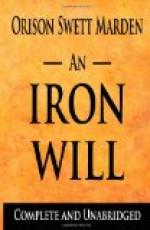To prosper you must improve your brain power; and nothing helps the brain more than a healthy body. The race of to-day is only to be won by those who will study to keep their bodies in such good condition that their minds are able and ready to sustain that high pressure on memory and mind, which our present fierce competition engenders. It is health rather than strength that is now wanted. Health is essentially the requirement of our time to enable us to succeed in life. In all modern occupations—from the nursery to the school, from the school to the shop or world beyond—the brain and nerve strain go on, continuous, augmenting, and intensifying.
As a rule physical vigor is the condition of a great career. Stonewall Jackson, early in life, determined to conquer every weakness he had, physical, mental, and moral. He held all of his powers with a firm hand. To his great self-discipline and self-mastery he owed his success. So determined was he to harden himself to the weather that he could not be induced to wear an overcoat in winter. “I will not give in to the cold,” he said. For a year, on account of dyspepsia, he lived on buttermilk and stale bread, and wore a wet shirt next his body because his doctor advised it, although everybody else ridiculed the idea. This was while he was professor at the Virginia Military Institute. His doctor advised him to retire at nine o’clock; and, no matter where he was, or who was present, he always sought his bed on the minute. He adhered rigidly through life to this stern system of discipline. Such self-training, such self-conquest, gives one great power over others. It is equal to genius itself.
“I can do nothing,” said Grant, “without nine hours’ sleep.”
What else is so grand as to stand on life’s threshold, fresh, young, hopeful, with a consciousness of power equal to any emergency,—a master of the situation? The glory of a young man is his strength.
Our great need of the world to-day is for men and women who are good animals. To endure the strain of our concentrated civilization, the coming man and woman must have an excess of animal spirits. They must have a robustness of health. Mere absence of disease is not health. It is the overflowing fountain, not the one half full, that gives life and beauty to the valley below. Only he is healthy who exults in mere animal existence; whose very life is a luxury; who feels a bounding pulse throughout his body; who feels life in every limb, as dogs do when scouring over the field, or as boys do when gliding over fields of ice.
II.
Yet in spite of all this, in defiance of it, we know that an iron will is often triumphant in the contest with physical infirmity.
“Brave spirits
are a balsam to themselves:
There is a nobleness
of mind that heals
Wounds beyond salves.”




